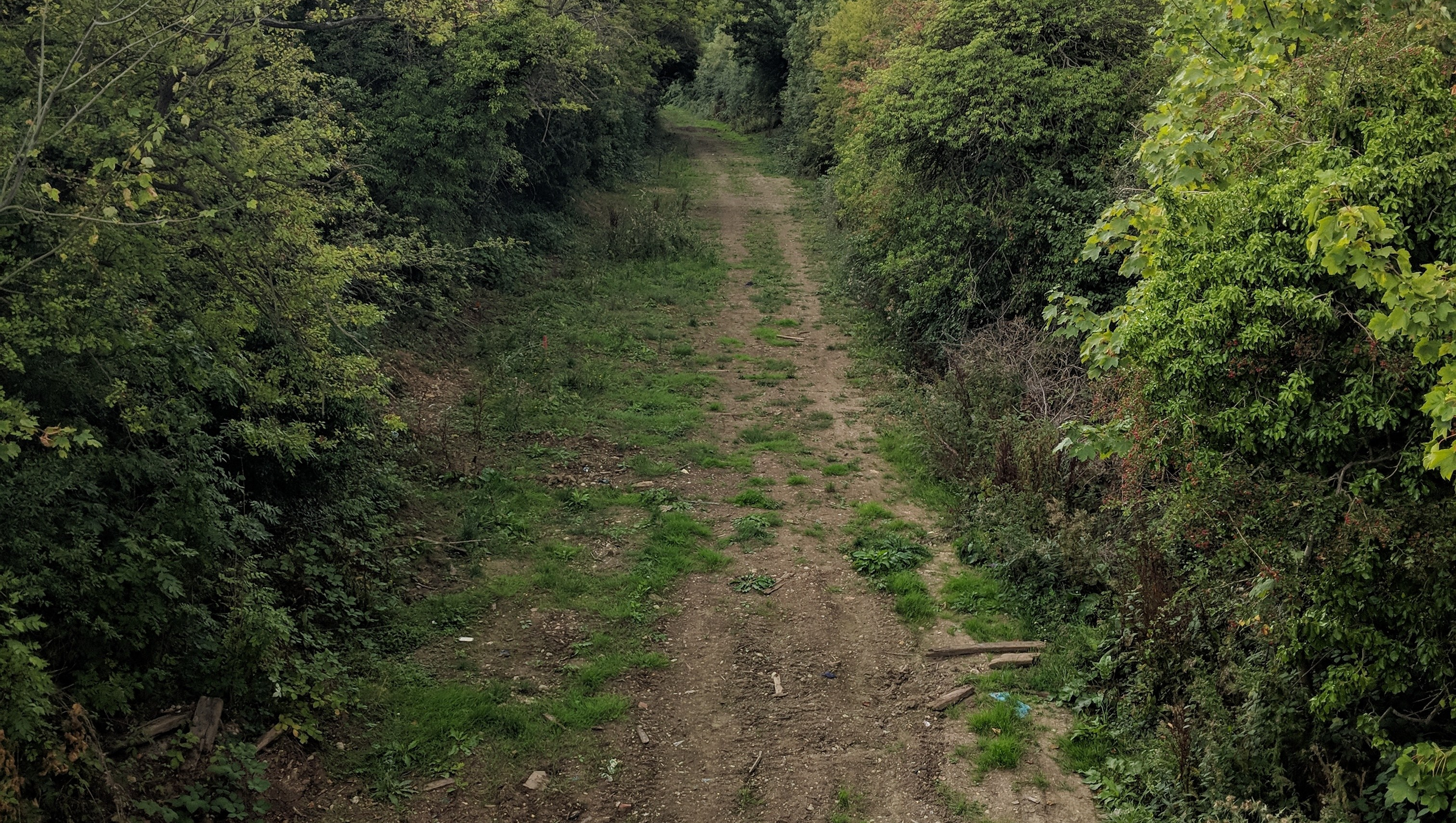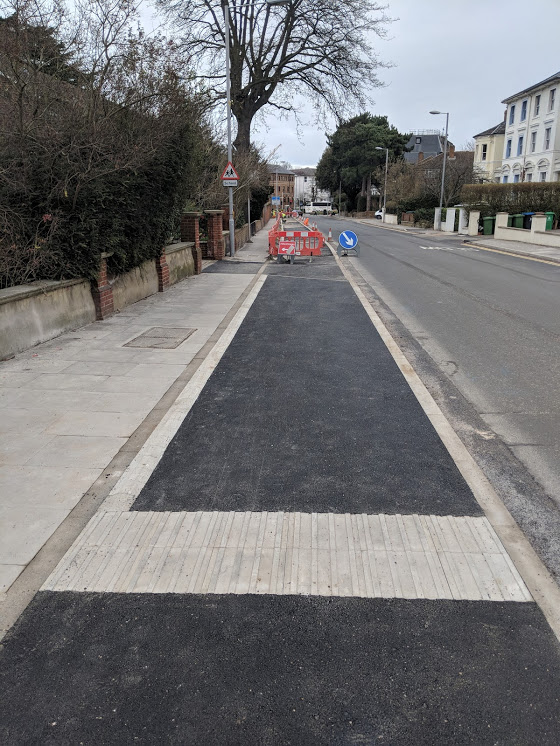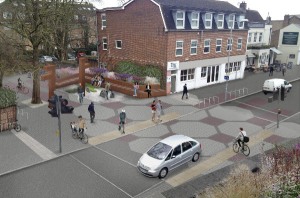Whilst the network of Kingston’s new Cycleways delivered as part of the Council’s ‘Go Cycle’ project is far from complete, it’s interesting to see the large number of people who are using the parts of the network already completed.
Although we see lots of people using the network on a daily basis, it is always interesting to have a look at real data to determine actual usage and look for any trends that can be spotted. We have therefore compiled some data from the Council’s existing Cycle Surveys as well as some more recent data produced from Vivacity traffic counting monitors which Kingston Council has been trialling and which we’ve received limited access to.
So, what does the data show us?
New Malden to Raynes Park (Cycleway 31)
This excellent Go Cycle project created brand new walking and cycling paths alongside the South Western train mainline between New Malden station and Raynes Park recreation ground.
Kingston Council’s 2020 cycling survey stated that an average of 320 people were using this route for cycling each day. However, in 2021, The Vivacity sensor data trial shows that 542 people on average used it for cycling (between 14 May and 21 November 2021).
In addition to people using it for cycling, 703 trips by people walking have also been recorded on average each day. Given that before this route opened people couldn’t walk or cycle at all along this path, the data demonstrates how amazingly popular it has become in such a short amount of time.

The popularity of the path is probably helped by it being away from roads meaning it has reduced air and noise pollution compared to alternative routes (for example, via Burlington Road).
Kingston to Kingston Vale (Cycleway 30)
This is the longest end to end Go Cycle project (4.5km) leading from the centre of Kingston to (almost) the Borough boundary with Wandsworth at the Robin Hood junction of the A3.
Despite construction being started in 2018, this Go Cycle route was only completed in full in early 2021 due to Covid related delays. However, parts of the route were open in 2020 and Kingston Council’s 2021 cycling survey stated the number of people using Kingston Hill for cycling was already increasing, with 363 people cycling on the route in 2020 compared to 211 in 2019 (noting that there had been a general increase in cycling in 2020 due to a national lockdown).
There isn’t a Vivacity sensor on Kingston Hill itself, but there is one on London Road near the end of the Go Cycle route by Tiffin School. This sensor shows an average of 1,521 cycling trips using the route a day (between 12 May and 21 November 2021). This compares with an average 15,467 cars being picked up by the sensor each day meaning, in the same year the route was completed, the number of cycle trips on this part of the route has already reached around 10% of the number of cars using the road!

Kingston to Surbiton (Cycleway 29)
This Cycleway was the second major road route to be completed as part of the Go Cycle programme (the first being Portsmouth Road). Unfortunately, this route suffers from many shared areas at junctions (where people cycling and walking mix in the same space), particularly along the Wheatfield Way part of the route. It therefore doesn’t provide direct, uninterrupted journeys for people cycling and its popularity as a cycling route is likely to be harmed as a result. Despite that, the Vivacity sensor on Wheatfield Way shows an average of 462 cycling trips on this part of the route per day (24 June to 21 November 2021) and 652 cycling trips on Penrhyn Road (6 May to 21 November 2021) based on a sensor near the Kingston University building.

There is also a Cycleway ‘link’ route along Claremont Road towards Surbiton that connects to Cycleway 29 but isn’t the main Cycleway 29 route. The Claremont Road Cycleway is an indirect route as a decision was made to reroute the Cycleway around The Crescent rather than continuing it along the full length of Claremont Road (which would have required the removal of car parking spaces). The Vivacity sensor here recorded an average of 298 cycle trips per day (6 May to 21 November 2021).
The final Vivacity sensor we’ve seen data for on this route is on St Mark’s Hill though again, this is just a Cycleway ‘link’ and isn’t the main route for Cycleway 29. As with Claremont Road, due to the decision to keep car parking spaces, there is only a segregated cycle path on one side of the road (in the direction up the hill) reducing its popularity for people cycling. The Vivacity sensor here recorded an average of 359 cycle trips per day (6 May to 21 November 2021 (excluding 5 days in June where data recording appears to have failed)).
Surbiton to Kingston via Portsmouth Road (Cycleway 28)
This was the very first Go Cycle route to be built and was completed to a very high standard after Kingston Cycling Campaign successfully obtained improvements to the original plans.
This route features a two-way segregated cycle lane for most of its length and was extended in 2018 to take the two-way segregated cycle path along most of Kingston High Street (though unfortunately it does not yet reach the Ancient Market Place).
Sadly a Vivacity sensor has not been placed on this route so we need to look at data released as part of the Kingston Council Cycling Survey to look at numbers using this route. Helpfully, the 2021 survey provided average cycling figures for 2018-2020 (which we assume are from the automatic cycling counters the Council has installed on this road):
- 2018 – 1,068 people cycling per day
- 2019 – 1,114 people cycling per day
- 2020 – 1,582 people cycling per day
As the survey notes, during the middle part of 2020 there was a large increase in cycling following a national lockdown (the number of cycle trips peaked at 3,891 on a single day during 2020!) so it will be interesting to see if this has increase has been sustained on Portsmouth Road for 2021. In any case, it is great to see an increasing number of people using this safer cycle route.
Is there any other data available for this route? Well, the Department of Transport also compiles traffic counts and has one for Portsmouth Road. Looking at the Department of Transport’s figures we can see an actual (rather than estimated count) was last completed in 2016. Whilst this is a ‘spot count’ (it only counts people using the road on a single day rather than averaging it over a longer period), it shows that there were only 815 people counted cycling using the road on the day the count was taking place out of 15,424 total number of vehicles counted. Compared with that ‘spot day’ and the latest Kingston Council figures, cycling along the route has therefore almost doubled between 2016 and 2020.
As with the Kingston to Kingston Vale route, assuming the total number of vehicles using Portsmouth Road has remained broadly steady since 2016, the number of people cycling on the route could again be around 10% of the total vehicles using the road!

Any other data?
Some other quick statistics:
- 1,370 walking or cycling trips on average per day across the new bridge taking people over the one-way system near Kingston Station (25 June to 21 November 2021 – Vivacity sensor data). Given this route was closed for over two years and only reopened earlier this year it’s already proving popular and allows for many more people to use it than the bridge it replaced.
- 421 cycling trips on average per day using the South Lane underpass to cross the A3. This is one of the few safe and convenient crossings of the A3 in this area (6 May to 21 November 2021 – Vivacity sensor data).
- Only 394 cycling trips per day on average on Coombe Lane West (2 May to 21 November 2021 – Vivacity sensor data). This route was removed from the first phase of the Go Cycle programme and therefore lacks segregated cycling facilities. This is despite it being a major desire route for cycling between Norbiton and Raynes Park. It also passes a number of current (and planned) schools as well as Kingston Hospital. We hope that Kingston Council will be successful in their funding bid for Go Cycle phase 2 which provisionally includes this route. Coombe Lane West could then see an improvement in cycling rates as seen on the Go Cycle phase 1 routes already constructed.
- More Department for Transport data suggests that, as mentioned earlier, there was a large increase in cycling nationally during the middle part of 2020 following a national lockdown. However, nationally, the data states that cycling levels in 2021 have broadly returned to those at the beginning of March 2020. The apparent increase in people cycling in Kingston during 2021 is therefore even more impressive.
What does all this data tell us?
It is important to emphasise that the Vivacity sensors are under trial and the figures used above have not been audited. However, the Vivacity sensors do seem to pick up a similar number of vehicles per day as shown in other recent Council traffic counts which use different technology. A trial of these sensors elsewhere in London also showed they were up to 97% accurate.
It is also interesting that the sensors can pick up ‘tracks’ of vehicles so can see what paths they are taking and which turns they make (see photo below). These images could help more easily determine the origin and destinations of journeys as well as helping understand whether people find the new cycling infrastructure useful or if they are avoiding it and are using the road instead.

We look forward to hearing the results of the full trial of the Vivacity sensors and hope the Council will keep those in place on the Go Cycle network as well as filling in gaps in their coverage on the remainder of the network.
The data seems to show that the New Malden to Raynes Park has been very successful and also, that where there is continuous high-quality segregated cycle routes, e.g. Portsmouth Road and London Road, that cycling rates can be a substantial portion of the total number of vehicles using the route. However, where there are gaps in segregation for people cycling, for example Wheatfield Way, cycling rates seem to be lower. We therefore hope this data gives Kingston Council the drive to look at improving the continuity of exiting Cycle routes to provide direct and segregated routes, even through junctions.
Overall, the numbers of people cycling on the Go Cycle routes seem to be increasing. However, with Phase 1 of the Go Cycle network still not complete and Phase 2 currently unfunded, it will be some time before everyone in the Borough lives next to a safe cycling network. Until that happens, cycling levels in the Borough are unlikely to reach their full potential.
You can visit the Vivacity sensor website to find out more about their sensors.
You can read more about the Go Cycle programme at the following links:
The Council’s Go Cycle website
Our map of Mini Holland routes open, in construction and proposed


















